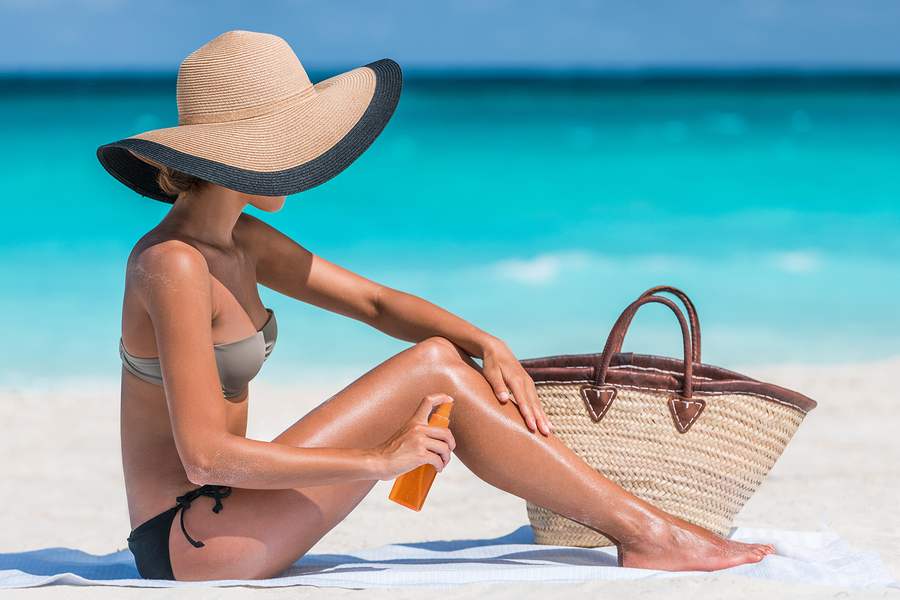How to Protect Your Skin from the Sun
 It’s important to to take care of your skin, especially during the summer, and sunscreen plays an important role in that. As much as we all love going out to the beach and spending time outdoors, the exposure to Ultraviolet Rays (UV) is very damaging for your skin, not only causing it to look dull and start premature aging but even causing skin cancer, in some cases. UVA rays are the AGING rays. UVB are the BURNING rays.
It’s important to to take care of your skin, especially during the summer, and sunscreen plays an important role in that. As much as we all love going out to the beach and spending time outdoors, the exposure to Ultraviolet Rays (UV) is very damaging for your skin, not only causing it to look dull and start premature aging but even causing skin cancer, in some cases. UVA rays are the AGING rays. UVB are the BURNING rays.
Among different brands, multiple SPFs, and face vs. body, there are so many types of sunscreen to choose from that it can feel overwhelming. But in reality, there are only two types of sunscreen, physical and chemical. A physical sunscreen protects your skin by blocking the sun rays, and a chemical sunscreen absorbs the sun’s rays. The biggest difference is the UV filters that they both use. There is nothing wrong with either one, and in fact, sometimes you can find hybrids.
Our favorites are Elta MD sunscreens because they are broad-spectrum (protecting from both UVA and UVB rays), fragrance-free, paraben-free, sensitivity-free and non-comedogenic. Elta MD is one of the leading sun care companies and has been protecting skin from the sun for over 25 years. They offer a broad range of sunscreens to fit your every need.
Where to begin? Use a broad spectrum sunscreen of SPF 30 or higher (up to SPF 50), daily and reapply every 2-4 hours. You also want to make sure that the sunscreen that you purchase contains Zinc Oxide, since this will protect your skin from UVA and UVB rays and is safe for all skin types. Remember, whether it’s spring, summer, winter or fall, sunscreen is always crucial for your skin health. It is never too late to start applying sunscreen and protecting your face and body from the sun.
Summer Skin Care Tips
Here are some other tips to help you protect your skin from the sun this summer:
- Remember the hat, sunglasses and long sleeves to help protect your neck, ears and face. Your hands are prone to sun damage, too, so don’t forget to wear gloves when you’re driving.
- Rinse. Chlorine can dry out your skin and hair almost instantly. Be sure to rinse both immediately after swimming in a chlorinated pool.
- Stay hydrated. Drink plenty of water and incorporate hydrating foods into your diet. Melons, berries and cucumbers are high in water content, which can help also help keep you hydrated.
- Avoid citrus. The combination of citrus fruits and sun exposure can cause a reaction known as “phytophotodermatitis”, which can cause your skin to become hypersensitive to UV light.
- Sleep tight. One of the most basic health practices is beneficial for your skin, too. Don’t let vacations and the change in your schedule interrupt your beauty sleep.
- Never skip your nightly routine. No matter what, don’t forget to wash your face and apply moisturizer every morning and night. Coconut oil works as an excellent make-up remover, as well as an all-over moisturizer, too!
- Increase healthy fats. Fish oil, olive oil and coconut oil can help hydrate your skin. Increase your intake during the summer months to ensure your face is quenched daily.
Daisy and Kim of Hotze Pharmacy discuss the secrets to youthful skin:
Hormone Imbalance and Your Skin
Did you know that a hormone deficiency and imbalance can also affect your skin’s health? Take our Symptom Checker Quiz today to find out if your symptoms could be caused by a hormone imbalance.
Related Content
